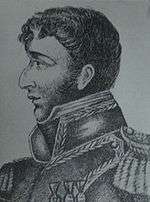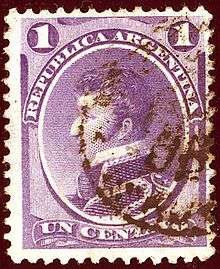Antonio González de Balcarce
Antonio González de Balcarce (June 24, 1774 – August 15, 1819) was an Argentine military commander in the early 19th century.
Antonio González de Balcarce | |
|---|---|
 | |
| 5th Supreme Director of the United Provinces of the Río de la Plata | |
| In office 16 April 1816 – 9 July 1816 | |
| Preceded by | Ignacio Álvarez Thomas |
| Succeeded by | Juan Martín de Pueyrredón |
| Personal details | |
| Born | June 24, 1774 Buenos Aires, Viceroyalty of Peru |
| Died | August 5, 1819 (aged 45) Buenos Aires, United Provinces of the River Plate |
| Profession | Soldier |
González de Balcarce was born in Buenos Aires. He joined the armed forces as a cadet in 1788. In the battle for Montevideo in 1807, he was captured by the British forces and taken to England. After his release, he fought in the service of Spain during the Peninsular War against the Emperor Napoleon. Returning to Buenos Aires, he participated in the May Revolution in 1810. Subsequently, he was named second commander for the military campaign of the independentist forces in the Viceroyalty of Perú, where he won the Battle of Suipacha on November 7, 1810, the first victory over the Spanish royal forces.[1]
Eventually, he was called back and became the Governor of Buenos Aires Province in 1813. In 1816, he served as the Supreme Director of the United Provinces of the Río de la Plata ad interim, and became the Major General of the armed forces the following year under the government of Juan Martín de Pueyrredón. According to historian William Denslow, Antonio Balcarce was a member of the well-known masonic lodge Lautaro.[2] He took part of the crossing of the Andes to Chile and was San Martin's second-in-command during the battles of Cancha Rayada and Maipu.
He fell ill in Chile and had to return to Buenos Aires, where he died in 1819.

References
- Historical Dictionary of Argentina. London: Scarecrow Press, 1978.
- Dunslow, William. 10000 Famous Freemasons. Richmond, Virginia: Macoy Publishing & Masonic Supply Co., 1957.